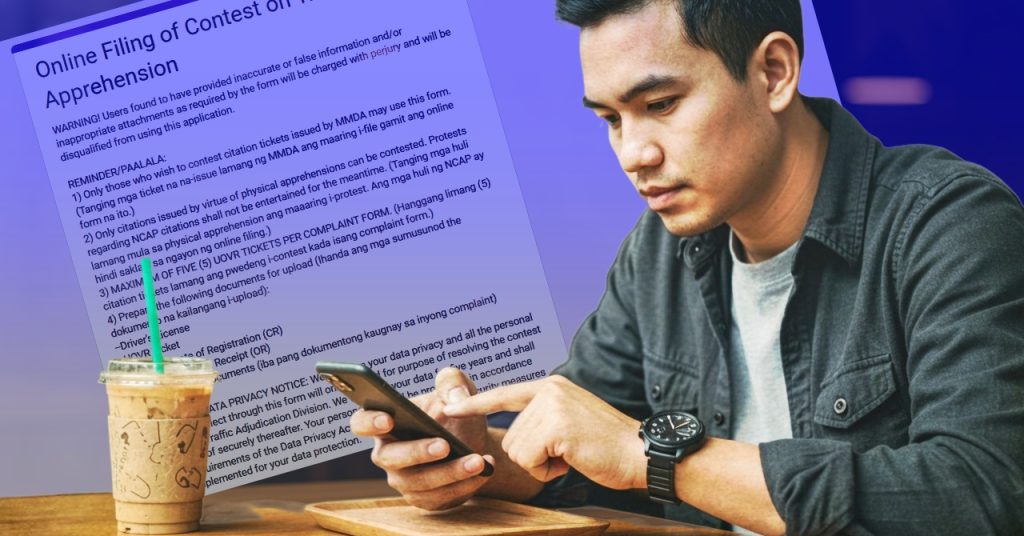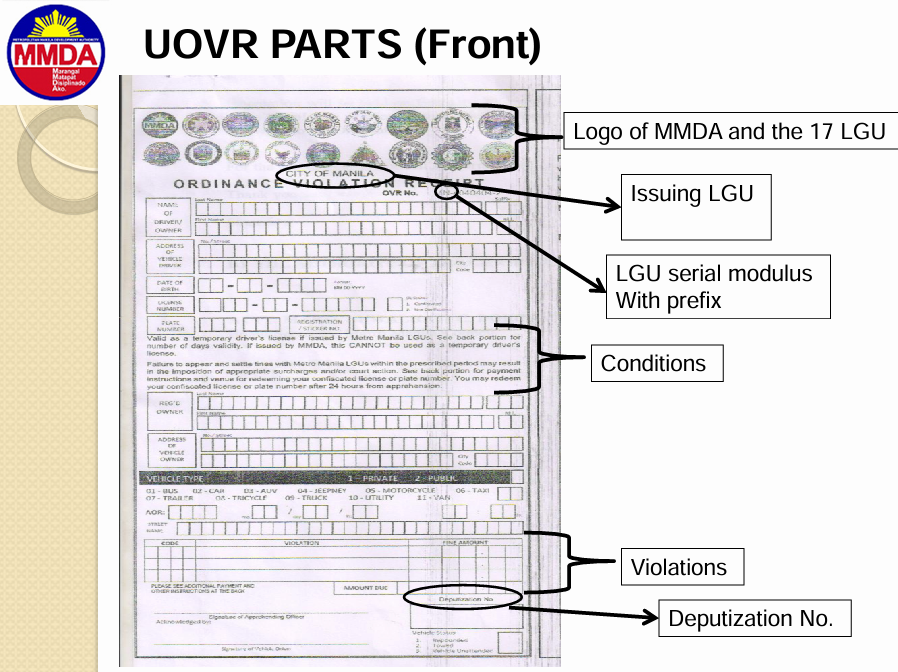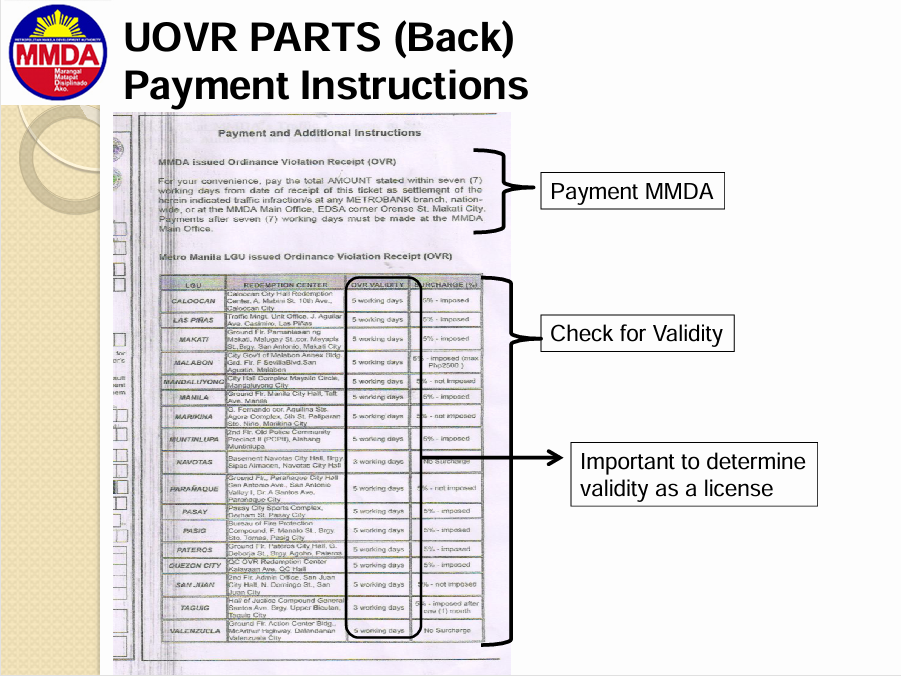Receiving an MMDA traffic citation can be frustrating, especially if you believe it was issued unfairly.
Thankfully, there’s a way to challenge your ticket without the hassle of visiting an office.
The MMDA now allows drivers to contest violations online through a digital submission process.
This service is free and available for motorists who were physically apprehended by an MMDA officer.
However, if your ticket was issued under the No Contact Apprehension Policy (NCAP) or by a local government unit (LGU), you will need to follow a different dispute process.

Overview of the No Contact Apprehension Policy
The No Contact Apprehension Policy (NCAP) was introduced to improve traffic enforcement by using cameras and other monitoring technology to identify violations.
This system allows authorities to issue tickets remotely without requiring physical apprehension by an MMDA officer.
Legal provisions for NCAP are based on local ordinances issued by respective LGUs, and enforcement is carried out through an integrated database linked to vehicle registrations.
If a motorist commits a traffic violation under NCAP, a notice of violation is sent to the vehicle’s registered owner, detailing the offense, time, date, and location.
While NCAP aims to reduce corruption and improve road discipline, it has also raised concerns about due process, disputed citations, and limited avenues for appeal.
Motorists wishing to contest an NCAP violation must follow the specific guidelines of the LGU that issued the ticket, rather than the MMDA’s online dispute process.
Who Can Dispute an MMDA Traffic Violation Online?
Not all traffic violations can be challenged through this online method.
You can file a dispute online if:
- The ticket was issued by an MMDA officer in person.
- You received a Unified Ordinance Violation Receipt (UOVR).
- You believe the violation was issued by mistake.
- You have all the necessary documents to support your claim.
However, you cannot use the online dispute process if:
- Your violation was recorded under the No Contact Apprehension Policy (NCAP).
- The citation was issued by a local government unit (LGU), not the MMDA.
- You do not have the required documents to support your dispute.
If your case falls under NCAP or an LGU-issued ticket, you will need to check the respective agency’s dispute process.
Understanding the UOVR
The Uniform Ordinance Violation Receipt (UOVR) serves as an official document issued by MMDA enforcers and local government units (LGUs) when citing traffic violations.
It consists of two main sections: the Front and Back parts.
Each part contains specific details necessary for identifying the violation, determining payment procedures, and understanding its legal validity.
UOVR Front:
- Logo of MMDA and the 17 LGUs
- Indicates that the citation is part of the standardized ticketing system.
- Issuing LGU
- Identifies which local government unit or MMDA officer issued the ticket.
- LGU Serial Modulus with Prefix
- Each UOVR is assigned a unique serial number for tracking.
- Conditions
- Specifies the legal parameters of the ticket, including whether it can serve as a temporary driver’s license.
- Violations
- Lists the specific traffic infractions committed.
- Deputization Number
- A unique number assigned to the traffic enforcer who issued the ticket.

UOVR Back:
- Payment Instructions
- Indicates where and how the fines should be paid.
- Payments can be made at MMDA-designated banks or offices within seven (7) working days.
- Check for Validity
- Identifies whether the UOVR can be used temporarily in place of a driver’s license.
- MMDA-issued UOVRs cannot serve as a temporary license, while some LGUs allow validity for a limited period.
- License Validity Determination
- Specifies the number of working days a UOVR remains valid for LGUs that issue them as temporary licenses.
- Driving with an expired UOVR may result in further penalties, including vehicle impoundment.
- Security Features
- The UOVR contains built-in security measures such as:
- Computerized Numbering (to prevent duplication).
- Relief Image and Thermochromic Ink (to verify authenticity).
- Coin Reaction Ink and Watermark (to prevent forgery).
- The UOVR contains built-in security measures such as:

How to File a Traffic Violation Appeal Online
Step 1: Gather Your Required Documents
Before starting the dispute process, make sure you have digital copies of the following:
- Your UOVR (Traffic Violation Ticket): This serves as the official record of your violation.
- Driver’s License: A valid copy of your license to verify your identity.
- Vehicle Documents:
- Official Receipt (OR) and Certificate of Registration (CR)
- Deed of Sale (if you are not the registered owner)
- Authorization Letter (if someone is representing you)
Make sure the scanned copies are clear and readable, as blurry or incomplete documents can lead to delays in processing your appeal.
Step 2: Submit Your Appeal Online
Once you have all your documents, follow these steps:
- Visit the MMDA Online Complaint Portal
- Go to the official MMDA dispute form at https://bit.ly/3J62YhH.
- The form is available from Monday to Friday, 8:00 AM to 5:00 PM.
- Submissions made after office hours will be processed on the next working day.
- Fill Out the Online Form
- Enter your personal details as shown on your driver’s license.
- Provide accurate information about your vehicle.
- Clearly state the reason for disputing the violation.
- Upload Your Documents
- Attach the required files in the specified format.
- Double-check that all documents are correct before submitting.
- Submit and Wait for Confirmation
- After submitting, you will receive an acknowledgment email.
- Processing time usually takes three working days.
Frequently Asked Questions
1. Can I dispute a ticket issued under NCAP online?
No, tickets issued under the No Contact Apprehension Policy (NCAP) must be contested through the respective LGU that issued them.
2. How long does it take for my dispute to be processed?
The MMDA usually processes online disputes within three working days after submission.
3. What happens if I miss my scheduled hearing?
If you do not attend your scheduled hearing, your dispute may be automatically denied, and you will be required to pay the fine.
4. Can I file a dispute if I already paid the fine?
No, once a fine has been paid, it is considered an admission of guilt, and you cannot dispute the violation.
Video: PAANO MAGCONTEST NG TRAFFIC VIOLATION THRU ONLINE | MMDA ONLINE FILING
The MMDA offers a way for motorists to dispute traffic violations through an online portal.
Users must fill out an online form with their personal information and details about the violation.
Supporting documents like the UOVR ticket and driver’s license need to be uploaded for verification.
The MMDA-Traffic Adjudication Division reviews submissions and schedules hearings if required.
The outcome of the contest is communicated to the applicant after the review process.
Recent Updates
Online Traffic Violation Contest Process
Motorists issued traffic tickets by the MMDA can now contest these violations online. The MMDA introduced a QR code and a link on social media for easy access. Motorists fill out an online form and upload their traffic violation tickets, streamlining the appeals process. This removes the need for personal visits to MMDA offices and waiting in long lines. In 2024, the MMDA resolved 62 complaints, and appeals can be submitted Monday to Friday, 8 a.m. to 5 p.m. (PhilStar Global)
Conclusion
Disputing an MMDA traffic violation online is a straightforward process, saving time and effort for motorists who believe they were cited unfairly.
By following the steps outlined in this guide, you can prepare your documents, file an appeal, and attend a hearing with confidence.
While the No Contact Apprehension Policy (NCAP) operates differently, understanding its legal framework ensures that you take the right approach for contesting citations.
Staying informed about traffic enforcement policies helps drivers make better decisions on the road and exercise their rights effectively.
Whether disputing a ticket or complying with traffic rules, responsible driving benefits everyone.